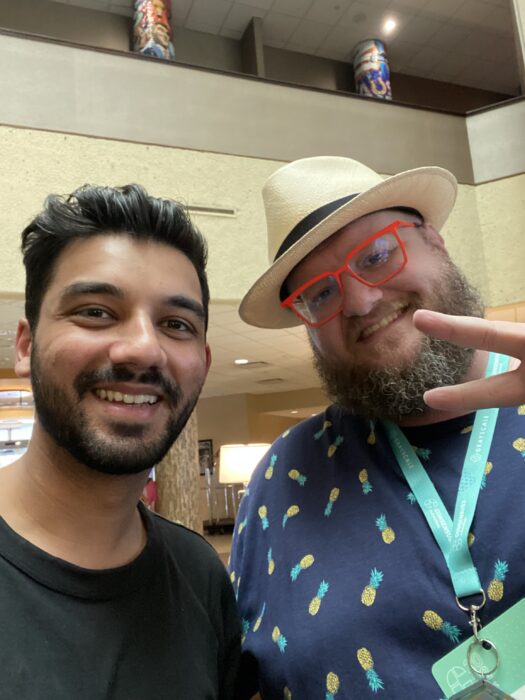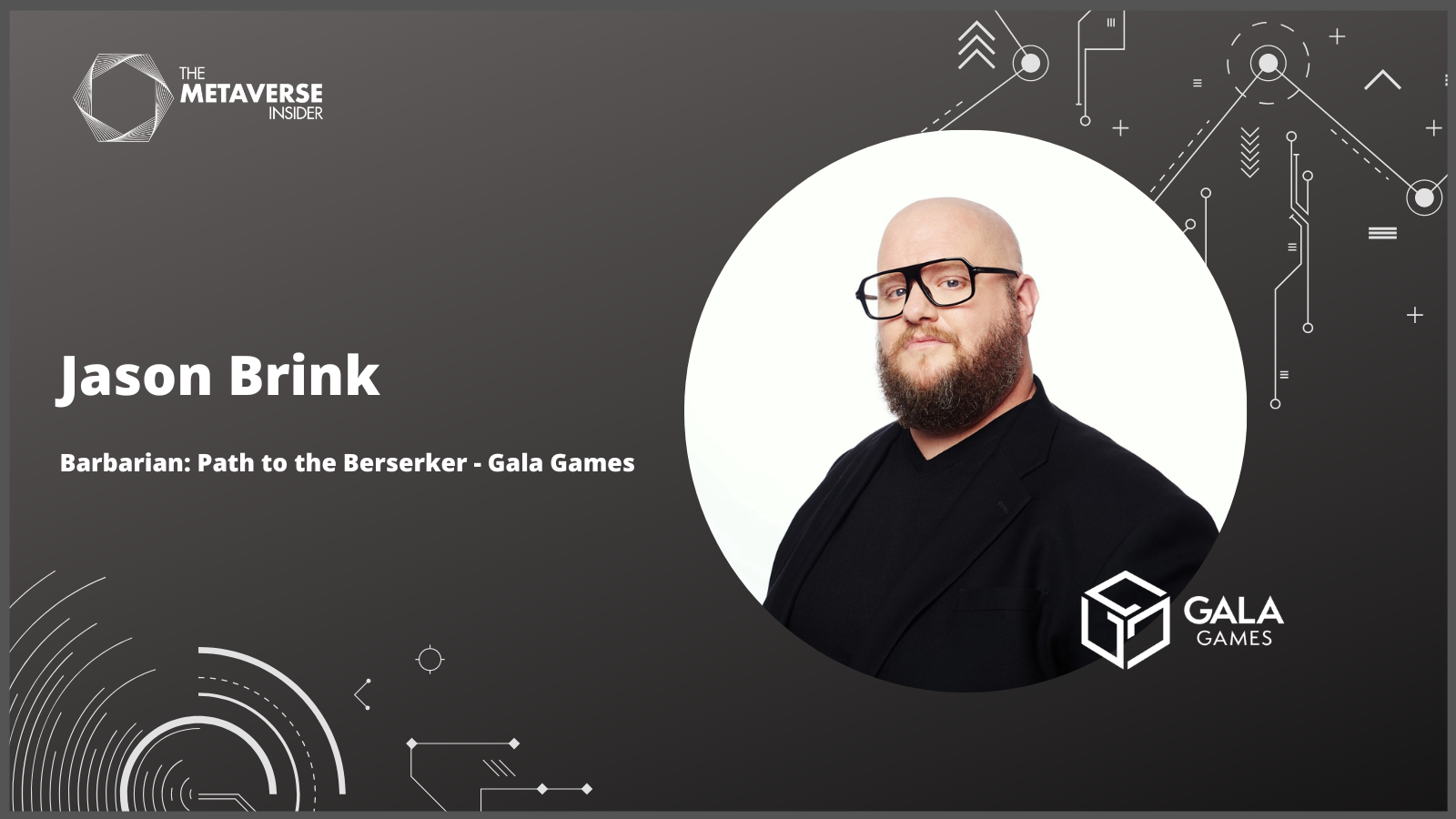Jason Brink is the President of Blockchain of Gala Games. He is an early adopter of blockchain technology and has been actively involved in cryptocurrency for nearly a decade. He also won the Bill and Melinda Gates Foundation / Global Development Network Prize for the creation of the “AidDollar”, a novel blockchain-based solution to solve the problems endemic to foreign aid.
We had the opportunity to conversate with Jason at Consensus 2022 in Austin. I started our interview by asking about his beginnings and how he became a part of Gala Games.
“There are a couple pieces to this that are that are very important. The first is how I got into blockchain. I’m going to tell you about that first, and then I’ll show how that connects to gaming. I got into blockchain after spending some time in Haiti in 2010, after the earthquake.”

“And basically, what the reason that I was there is, I’m doing disaster relief work. But while I was there, we were running into lots and lots of problems where there was 10s of millions of dollars flowing into the country. But none of it was getting to the people who needed it the most on the street.”
“This is obviously terrible. We were having situations where there was one particular instance, where there was a mother, who gave birth to twins, at the hospital, and they only live for about five minutes because the mother was malnourished.”
“And there’s no food, there’s no opportunities, cholera is everywhere. Very, very terrible. And this got me thinking about how disastrous the entire foreign aid flow is because what typically would happen, and what still happens today, is that you have a country, that dedicated sum of money to go to help another country, and it gets passed to that other country sent out over as a, like a wire transfer, or in some situations, they’ll actually do things like take cash.”
“And then every time that money moves in that country, a little bit disappears. Because there’s some bureaucrat somewhere skimming. And this is really, really a massive problem in the developing world, especially in situations, like post disaster areas because it’s a where people need help the absolute most, and be where there’s the least accountability.”
“And where there’s the most funds going to, because anytime something really bad happens, people are very quick to send money, but it just creates tons of opportunity for people to steal that money.”
“This is terrible. So, I created something that was known as the AidDollar. It was just a proposal that I put together. And I entered into a Call for Papers from the Global Development Network.”
“And I ended up winning. So the Global Development Network, and the Bill and Melinda Gates Foundation thing, where I basically said, Okay, well, we need a, a type of technology that allows the transfer of wealth from the person who’s donating to the person who’s using at the street level. That cannot be interrupted between point to point. So there’s no way for someone to take a little bit off the top. So I have put together this proposal, it ended up winning the prize. That kind of catapulted me into the space a little bit.”
“What was interesting is that working with NGOs, and working with governments and things like that, you realize that governments and NGOs, for the most part, will never move quickly enough to actually help the people who need it the most.”
“They’re too risk averse. What you have to do then is you start looking at other ways to help the people who really need help. This is where blockchain gaming and play to earn ecosystems comes in. If you wanted to put $5 into the hands of everyone in the Philippines, for example, and you wanted to do that through a government or an NGO, it’ll take forever. You want to do it through gaming, or social media can make it happen right away.”
“This is where I began working with gaming. And this was the impetus behind the founding of Gala games, which was founded by Eric Schiermeyer, who was the one of the co-founders of Zynga, and a couple other people and myself, who all basically came together to find this company. And we were very, very happy to do so because we knew that it could approach and attack some of these problems that were very systemic. So that’s, that’s essentially why we did it.”
I was fascinated to hear Jason’s story. He is one of the few who did not get involved in the blockchain space for financial gain. He realized that using blockchain technology would help the unfortunate in developing countries. Thus, play-to-earn games mainly were for countries where smaller amounts like $5 will make a big difference.
Therefore, I asked whether he was targeting specific countries. Moreover, for a more sustainable gaming platform, how does he ensure these games are fun and not just a money-making tool for players.
“Here’s the thing. We’re not really targeting specific countries. Okay, we have a massive, massive global presence right now and it’s all over the place. But with that said, I would still like to answer the other half of that question, which is how we build a sustainable economy in a way that makes sense. And the way that we build that sustainable economy is we recognize that we have different types of users. And on one we hand, reduce onboarding to a minimum.”
“So, for example, last week, we announced at Galaverse that we had signed a partnership with Epic Games to put Grit into the Epic Store. That will enable 194 million Epic Games users to use their Epic account to log into Gala. Okay, that’s huge! THAT’S GIANT! And no high friction onboarding process, no pain in the ass wallet creation. It is a very, very smooth, easy onboarding process. So, the first part of mass adoption is things like that. Taking the power of a web2 company, the user base of a web2 company and creating a bridge into the web3 worlds. So that’s the first thing.”
“The second thing that’s critical here is addressing the fact that you have different types of users who have different experiences and different needs. So there have been games in the web3 space, I’m not going to name any names, that have been very popular. But they’re only very popular because they pay you. You see people in the Philippines with 50 mobile phones on a gigantic board, and they’re just sitting there doing this (swiping) across each phone to do the next thing. That’s not the way that this is supposed to be. It’s not a fun game. It’s not a fun user experience. So the way that you really make an amazing game is that it starts with play.”
“It starts with fun. Your game has to be fun, or it’s not a game. It might be a job. And maybe that’s okay. But it needs to be a game. And to be a game, It has to be fun! It has to be something that you would play without getting paid. And the reason for that is that you want a good chunk of your player base to play without getting paid. Or even better, to play while paying in. Now, this is important because here we are sitting in this this hotel, there’s a Starbucks over there. Now that Starbucks sells coffees for about $7. Right. Now, do you have a Starbucks every once in a while?”
“Yes, almost every day” – I said…
“So you’re spending $7 a day on coffee or more. I’m sure there are some days where you know, you sit in Starbucks doing some meetings and you’re just drinking coffee all afternoon. Now the reality is that for you, earning $1 playing a video game is not particularly compelling. There are very popular blockchain games, I don’t know any gamers who have actually played them. Because they’re not fun.”
“People play them for sure. But not gamers. And this is the problem. What this means is that you have only a demand side economy in your game. And it’s all just printing new tokens to give to these people so that they can take them out of the ecosystem. It’s not stable, it’s not sustainable. But if you have a game that’s actually fun, that people want to play for free, or to even pay to play, or pay to upgrade their, for example, spider tanks. We have, we have 10s of 1000s of users right now.”
“We’re playing Spider Tanks on a daily basis, having fun, and they’re not getting paid anything because we haven’t turned that part of the ecosystem on yet. They’re playing because it’s fun. Now, what that enables is if you have people who are willing to put energy into the ecosystem, you have the ability to enable some other people who really need that dollar are to take it out.”
“You have to have both sides of the equation. I think the future of play and earn and, earning and games and things like that is based around this concept of building much more robust economies. This is one of the reasons we have a massive internal economics team. That specifically focuses on these issues. That’s what it takes to build something that will truly stick around.”

It was interesting to get Jason’s take on Play-to-Earn games. His point of view was pretty straightforward – we should not be playing games because we think we, as players, can make money while playing. He focused on building enjoyable games at Gala Games rather than building a money-making tool like some other web3 gaming companies.
Next, I asked for his opinion on the Metaverse. I knew Gala Games had partnered with Unity to build out VOXverse. Thus, I was looking forward to hearing where Jason thought this emerging industry would end up.
“The first thing and this is an unpopular opinion. And this is a tiny bit spicy. So, readers should like this. The concept of Metaverse is almost universally incorrect. A lot of people think about the concept of Metaverse, and what they really mean is a 3D game. That’s not what a Metaverse is. That doesn’t mean that these things are bad. It just means that they’re not metaverse.”
“I look at them as miniverses. You can have a bunch of miniverses that can all interconnect with one another in a cool way. And then eventually, over time, as interoperability increases as people develop the tools to actually build something that looks like it’s not made out of Legos, I think that we can get some really, really cool implementations out of that.”
“But with that said, if we take the concept of Metaverse, abstractly, what we’re looking at primarily is it needs to be persistent. It has to be generated in or at least provide the opportunity for people to generate user content. It has to have essentially free access that anyone who wants to plug into it and play.”
“I don’t want to be like the grumpy, intellectual elitist. If you go back and read Snow Crash, you know, it’s a very different thing than what you’re seeing today. You have various Metaverse projects and they’re not really metaverses. So our partnership with Unity is to build out the VOXverse. We do not call it a metaverse. But it is a VOXverse. It’s just the world in which the Vox lives. It is fictionalized and it has room for all of these different types of characters in there. And that’s super, super cool and super, super fun!”
“I think it’s going to be a long time before we see a true Metaverse, and I think the primary reasons for that center around issues with licensing. You read a book like Ready Player One, in which Ready Player One is like the thing that everyone thinks about when they think of Metaverse. ‘I’m gonna fly the Millennium Falcon. And I’m gonna park the Millennium Falcon, and then I’m gonna roll the ramp down, and I’m gonna bring the Back to the Future car out from the back and drive it around.’ Cool. That’s a licensing nightmare! Like anyone who’s ever talked to LucasArts, or Disney about licensing knows that that’s probably not going to happen. I think that it’s one of those really cool ideas that is impossible to implement. Unless you just have a bunch of users created content. If you have a bunch of user created content, that’s cool, because it doesn’t have the same issues. But it’s not what people envision.”
Jason had given a lot of information in one short answer. What I took away from his statement was that we may not see a metaverse soon. However, web3 games like the ones Gala Games has been working on will be adopted by many gamers. But when there is a metaverse, will it be a centralized metaverse like Ready Player One or a decentralized metaverse?
“It’s a good question. I think that what you’re going to end up seeing in the end is a kind of European Union of metaverses. A collection of sets centralized entities that are all working together in a semi decentralized fashion to build out some big thing. That would be my guess. I don’t know.”
My last question to Jason was regarding the bear market we are currently encountering. Jason has been in the blockchain space for a very long time. As mentioned at the start of this article, he has been in this space for the right reasons: to help people who can benefit from blockchain technology. Thus, I asked him how many companies/projects he thinks will indeed survive this bear market.
“I think very few are going to survive. And I think that’s a good thing. Let me explain that a little bit, because I know that that sounds a little rough. In this space, I’ve seen various boom and bust cycles. You see the super overheated craze of the ICOs followed by the collapse.”
“(You see) the rise of various types of staking coins and then the collapse of these fads. We’ve seen NFTs over the last couple years. And now, all of that’s on fire. And that’s not bad! Because the problem is people think that blockchain is insane, because there are so many people who are scams, they’re low quality projects. How many PFP projects that are out there right now? If you looked on OpenSea, probably 5000-6000 different PFP collections. How many of those are ever going to go anywhere? Very few.”
Once that dude shipped the little program that you could just put the little pictures in and print out an entire generative collection. So many of those things (NFT projects) were pushed out. So few of them have any sort of real utility. A lot of that is going to go away.”
“The same is true with the ICOs. So, during the ICO craze, we saw people raising money for all sorts of crazy things. Very few of those ever were built out to fruition. So I think that you’re going to see a lot of these companies not be able to make it through. But what it means is that the ones that are good companies and the ones that are really working, will, they will succeed, and they will rise above all of this. And that’s the critical thing.”
The important thing to remember in a bear market is this is when the best building happens. It’s when people buckle down and focus on creating an amazing product. Because they know that they need to get it done in the event that there’s another Bull Run, so that there’s something that so they can show what they’ve done and show how they’re differentiated.
“My advice to everybody is to, don’t freak out, don’t worry about it. Maybe you need to just turn off your BlockFolio app for a little bit and delete it from your phone or at least turn off notifications and come back in six months, if that’s what it takes.”
“Unless you’re working in this space, and you’re just somebody who’s bought some crypto, and it’s stressing you out. Just turn off the apps! Don’t look at it for a little bit. The people who have done the best in in crypto, that I’ve known, have been the people who bought something like Bitcoin or Ethereum, put it in their wallet and then for forget about it for four or five years.”
“Those are the ones who’ve done the best. And they didn’t look at it every day. They just kind of went and did their life.”
“So just keep on building in this space if you’re part of it. If you’re not actively part of the space, professionally speaking, consider this is a great time to jump in. You know, this is a wonderful time to start building something and to actually build something amazing. And don’t let it stress you out. Because it’s all cyclical. This has happened before it’s going to happen again, and it helps clean out the deadwood.”
Jason’s response was blunt but honest. This interview was during the Consensus event in Austin, where hundreds of businesses and projects were on display. While it was fascinating to see so many people fascinated with cryptocurrencies, blockchain etc., we must realize that many of these startups may not be around a few years from now.
However, I was also happy to hear Jason’s encouragement for jumping into this space and building in this space. This is great for anyone who may be discouraged by the recent bear market. It’s a great time to build as when there is a bull run again; developers can benefit if they make a good product.
Digital Twin Insider would like to thank Jason Brink for taking the time out during a hectic Consensus week. Jason made some excellent points regarding where the metaverse industry is heading, the future of web3 gaming and the situation regarding the current bear market. We wish him the best of luck for all his philanthropic efforts and the projects Gala Games is building.
For more market insights, check out our latest Digital Twin news here.













